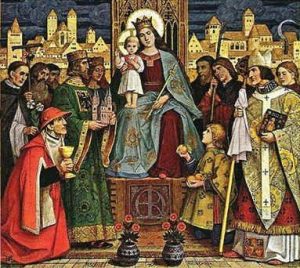HOMILY WEEK 20 04 – Year I
Stop Sinning and Start Loving:
Memorial of the Queenship of Mary
(Judges 11:29-39; Ps 40; Mt 22:1-14)
**********************************************
 The readings for today’s memorial of the Queenship of Mary (there are optional readings from the Common of the Blessed Virgin Mary) provide us with a challenge: how are we to reconcile the themes of war, bloodshed, child sacrifice, murder, violent revenge and punitive exclusion with the mild and meek Mary, Mother of God?
The readings for today’s memorial of the Queenship of Mary (there are optional readings from the Common of the Blessed Virgin Mary) provide us with a challenge: how are we to reconcile the themes of war, bloodshed, child sacrifice, murder, violent revenge and punitive exclusion with the mild and meek Mary, Mother of God?
May I suggest by making the Kingdom of God the top priority in our lives, and imitating Mary in doing God’s will.
Violence in the scriptures, especially in the Old Testament, but as we see in today’s gospel, also in the New Testament and from Jesus himself, has always posed a problem for scripture exegetes. In the first reading, we are told the “spirit of the Lord” came upon Jephthah, who after praying to God for success in war and making a foolish vow to sacrifice the first person who comes out of his home, wages war, defeats his enemies, and ends up sacrificing the life of his one and only daughter.
In the gospel, Jesus recounts the parable of a king who, rebuffed by those who ignored, made light of, rejected his invitation to the wedding banquet for his son, and even killed the messengers, responded with rage and violence, destroying them and burning their homes. On top of that, he throws out of the banquet one person found without a wedding robe, “where there will be weeping and gnashing of teeth.”
What are we to make of all this violence? The best explanation I think comes from Ron Rolheiser OMI, who calls all that violence metaphorical – it is symbolic and meant to teach humanity some important lessons. Added to that is the teaching method of Semitic Hyperbole – exaggeration to drive home an important message – like a parent telling a child “I told you a thousand times not to do that!”
Within this context of metaphor and hyperbole, the key words are “kingdom of God.” That was always the main concern for Jesus, who came to inaugurate the kingdom of his father here on earth as a gratuitous gift of faith. So, what all these stories are teaching is that absolutely nothing in our lives should hamper in any way the kingdom of God intended for us to enjoy. That description of those invited making light of the kingdom and even killing the servants, not only foretells what would happen to him (the king’s son) but also reminds us of what is happening today, as so many people put faith far behind the other interests in life (on any given Sunday, worship is replaced by sporting events is just one example).
All the war and violence are meant to teach us that we are to do violence to ourselves, that our struggle is against spiritual powers, that we are to crucify and destroy any evil within us that would hamper the coming of that kingdom within us. Those who understand this best are recovering alcoholics who realize they can’t have an ounce of alcohol in their system, or they will relapse and could die. It is like that for every one of us spiritually. When we die we will no longer sin – to enter the kingdom of God, and to be baptized, is to die to sin, because we can’t drag any sin or evil or even unfinished business into the kingdom of heaven. It all must be destroyed, die, be rejected totally.
How are we to respond to this? By accepting the invitation to enter into the banquet of eternal life right here and now. Pout crassly, we are to stop sinning and start truly loving. Psalm 40 puts it succinctly – “Here I am Lord, I come to do you will.” That is the answer – just do the will of God.
That will of God is to believe in his Son Jesus Christ, and to do his will, which is to live the Beatitudes and keep his commandments to love God with our whole being, love others as we love ourselves, love one another as Jesus has loved us, and above all, to love our enemies by forgiving them from the heart.
There is an added element in the first reading that is important – we are also to avoid being stuck in grief, anger and resentment by mourning and grieving our losses, as did the daughter of Jepthah, bewailing her virginity on the mountains with her companions for two whole months.
The wedding garment adds another important element. I think it represents the need to repent, to do metanoia, to change, to put on our highest mind, to let go of over-attachment to especially possession, prestige and power in our lives. After all, Jesus’ first homily after his baptism was “repent and believe, for the kingdom of God is near.” It is a lack of faith and repentance, which go hand in hand, that prevents us from entering that kingdom.
Today’s memorial of the Queenship of Mary offers us an example for us to imitate (just as important as devotion to her). Mary was immaculately conceived, knew she was a lowly handmaid, that nothing was impossible for God, the perfect disciple who knew Jesus best and believed in him first. This memorial was instituted by Pope Pius XII in 1954 “so that all may clearly recognize and more zealously venerate the kind and maternal rule of the Mother of God.” It is celebrated on the octave of the Assumption.

Madonna & child, St Mary’s Oblate Residence, Battleford
It seems that today’s feast of the Queenship of Mary has some interesting Oblate connections. Our congregation, the Missionary Oblates of Mary Immaculate, to whom I belong, apparently had a role in asking the Pope Pius XII to institute this feast of Mary. We Oblates pray that she will continue to accompany us and intercede for us in our life and ministry.
The Eucharist is a foretaste of that eternal banquet we will fully share in someday – an experience of the kingdom through forgiveness and healing. We listen to the Word of God and commune intimately with Jesus Christ, the Real Presence, who came to redeem and sanctify us, and bring us into his kingdom.
May our celebration not only make us more holy and ready to do the will of the Father in our lives, but also send us out as servants to invite the rest of the world into the heavenly banquet already present to those who believe and do the will of God.




Yes, we are to stop sinning by moving towards God by asking for help if we want change. We cannot enter the kingdom of heaven by being sinners and we have not gone through reconcilation and learn to forgive others and ourselves. We have resolve any unfinished business and letting go of all mistakes , faults and negative thoughts. We are to forget about it including our past by learning to move forward. When we are forgiven and healed for our past and wrong doings then we will be redeemed and sanctified. We are to be pure and baptized to enter the kingdom of heaven. Then, we are to do God’s will by being his servants by inviting others to enjoy this heavenly banquet and so they can recognize God. Amen. Praise to you Lord Jesus Christ.
The Queenship of Mary pray for us and lead us closer to God and help us complete Jesus’ mission. Thanks for the beautiful reflections and teachings about today’s readings. Bishop Sylvain Lavoie ????❤️❤️???????